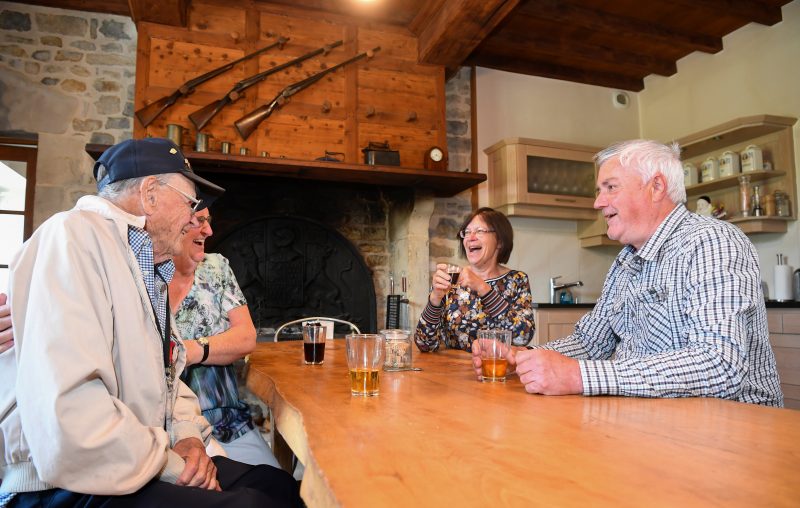US D-Day veterans find ‘second family’ in modern Normandy
95 year-old WWII US veteran James Carroll (L) returned to the town he helped liberate from the Nazis 75 years ago to stay with his ‘second family’ there for the second year running (Damien MEYER)
Sainte-Mère-Église (France) (AFP) – Three quarters of a century ago, they came to Normandy’s beaches as young men, many still in their teens, braving German fire to free France from Nazi occupation and help win the war in Europe.
But 75 years later, American veterans returning to northern France have struck up relationships with local residents and communities to find what they call a “second family”.
Thousands of people are expected in Normandy on Thursday to remember June 6, 1944, when 156,000 Allied troops crossed the English Channel to dislodge German forces from the French coast.
One of them is James Carroll, an American veteran who arrived, aged 19, on June 12, 1944, on Omaha Beach, the bloodiest of the five Normandy sites picked for the D-Day landings.
Local charity Veterans Back to Normandy raised money for 13 American veterans — including James Carroll — to travel to Normandy and stay with host families.
“The level of commitment shown by families here is really impressive. For the veterans, they’re like a second family,” Valerie Gautier-Cardin, head of Veterans Back to Normandy, said.
“In our country, half the people don’t even know what Omaha Beach is, they don’t even know what D-Day is,” James Carroll said. “That’s why I love to go to schools for interviews with the pupils.”
For the second consecutive year, Carroll is staying with the Maillet family near Sainte-Mere-Eglise, one of the first towns liberated during the invasion, where US troops flew the American Stars and Stripes from a church on June 6, 1944.
– ‘Friends for life’ –
“We’re friends for life. All the people down here are really nice to us,” said James Carroll.
“When we went to Sainte-Mere-Eglise, we couldn’t move 50 metres for people stopping the car!” said Catherine Maillet. “Everyone wanted an autograph or a kiss on the cheek.”
“It’s a shock for the veterans who come back for the first time to be treated like heroes,” said her partner Jean.
But for Carroll, a hero’s welcome is the last thing on his mind.
“I am not a hero. I just got lucky. Some of my friends did not”, he said.
For Catherine Maillet, hosting veterans “helps us make a link between what we read in history books and real people. My father was imprisoned during the war and he never wanted to talk about it”.
But veterans are not always given the best welcome, she says.
“When you pay 75 euros (85 dollars) to attend a reception with veterans who don’t earn a cent and have to settle for a ready-meal worse than plane food…,” she said, referring to a reception organised recently by one US organisation.
Respecting veterans is important for Valerie Gautier-Cardin from Veterans Back to Normandy, who travels to the US several times a year to meet veterans too old to travel to France, to remind them “that we remember them”, she said.
– ‘Very warm relationship’ –
A few dozen kilometres away, Native American veteran Charles Shay, aged 95, is staying with Marie Legrand, who has been hosting war veterans at her home in Caen since the 1980s.
“She cares for me, she does everything for me so I am very happy to know her and very happy to have met her,” explained Shay, who has been living with Legrand for the past year.
“Charles had health problems that he couldn’t take care of in the US. He moved here and had his operation in France,” she explained.
This “very warm” relationship between local communities and American veterans was built after the war, said Henri-Jean Renaud, whose father was the mayor of Sainte-Mere-Eglise in 1944.
“The cemetery at Sainte-Mere brought us closer together,” he said. “When you see 13,000 men being brought down on stretchers to be buried, that does something to you”.
Renaud turns the pages of his notebook, which lists the names of his American friends; crossed out are the names of those who have died.
This week, he is hosting an American general. “Four hundred Americans are arriving tonight,” he said. “They will be hosted by French families”.
Disclaimer: Validity of the above story is for 7 Days from original date of publishing. Source: AFP.


